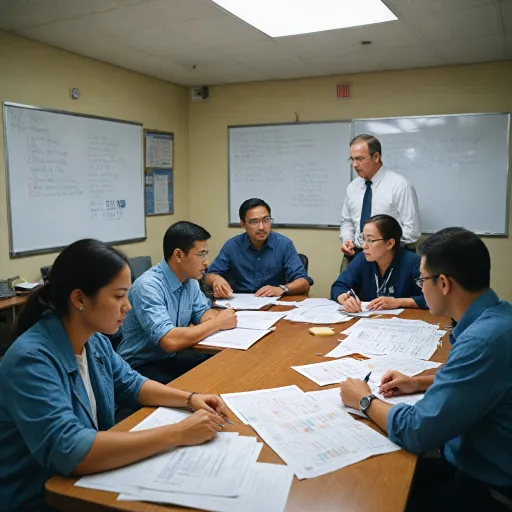
Understanding the Role of AI in HR
The Evolution of AI in Human Resources
In today's rapidly evolving landscape, artificial intelligence is increasingly becoming an integral part of human resources. Transforming traditional HR processes, AI offers innovative approaches to managing various facets of employee engagement, development, and performance. While healthcare is no stranger to technological advancements, integrating AI specifically for human resources brings novel opportunities for enhancing job performance and competency assessment. AI's impact on HR extends beyond mere automation, providing data-driven insights that enhance the effectiveness of performance reviews and competency evaluations. With AI integration, the job description of employees such as medical assistants can be dynamically updated to reflect real-time performance data. This not only ensures that expectations are clearly communicated but also facilitates a more tailored approach to employee development. Performance evaluation forms and competency checklists, once paper-heavy and cumbersome, are becoming more streamlined and paper-free. AI-driven systems allow for real-time feedback collection, enabling more effective performance appraisals and job performance reviews. Such advancements empower HR professionals in the healthcare sector to allocate their time and resources more efficiently. Furthermore, the role of AI in human resources isn't limited to performance metrics alone. AI promises a more holistic approach, ensuring that employee competency and engagement are continually nurtured. This can lead to fostering a culture of continuous improvement, whereby medical assistants and other healthcare employees are encouraged to upskill and align with the ever-evolving demands of the medical sector. Exploring current opportunities in human resources demonstrates how AI can revolutionize the field. For more insights into how AI is shaping entry-level HR positions, consider exploring entry-level HR positions with AI integration.Key Competencies for Medical Assistants
Essential Skills for Medical Assistants
Medical assistants play a crucial role in healthcare settings, bridging the gap between patients and healthcare providers. To ensure effective performance, it's vital to understand the key competencies required for this role. These competencies not only enhance job performance but also contribute to overall employee engagement and satisfaction.
Core Competencies and Expectations
Medical assistants are expected to possess a diverse set of skills. These include both technical and interpersonal abilities. Here are some essential competencies:
- Clinical Skills: Proficiency in taking vital signs, administering injections, and assisting with medical procedures.
- Administrative Abilities: Efficient management of patient records, scheduling appointments, and handling billing processes.
- Communication Skills: Clear and compassionate communication with patients and healthcare teams.
- Problem-Solving: Ability to address patient concerns and resolve issues promptly.
- Technical Proficiency: Familiarity with electronic health records and other healthcare technologies.
Developing a Competency Checklist
Creating a competency checklist is essential for evaluating medical assistant performance. This checklist serves as a guide for performance reviews and helps in setting clear job expectations. It should include specific skills and behaviors that align with the job description and organizational goals.
For a comprehensive approach, consider integrating feedback from performance appraisals and employee evaluations. This ensures that the checklist remains relevant and effective in assessing competency levels.
Enhancing Team Dynamics
To further support the development of medical assistants, exploring personality assessments can be beneficial. These assessments help in understanding individual strengths and improving team dynamics. For more insights, consider enhancing team dynamics with personality assessments.
By focusing on these competencies and utilizing tools like competency checklists, healthcare organizations can foster a supportive environment that encourages growth and development for medical assistants.
AI-Driven Performance Review Systems
Revolutionizing Reviews with AI-Driven Systems
In the ever-evolving medical field, ensuring the performance of medical assistants aligns with healthcare standards is critical. Methodical performance evaluations are integral to this process, and AI-driven review systems have become indispensable tools for human resources in assessing medical assistant performance effectively. AI-driven performance review systems offer precise appraisal methods by analyzing real-time data and providing immediate feedback. Such systems enhance engagement through personalized suggestions based on an assistant's unique strengths and areas for growth. This precision not only streamlines evaluations but also aligns with the competencies outlined in the competency checklists, ensuring that key skills and expectations are consistently reviewed. These systems use performance reviews to set clear goals and provide tailored developmental pathways for medical assistants. This is an ongoing process that impacts employee performance positively by identifying improvement areas and recognizing achievements. The implementation of AI in performance appraisals transcends traditional methods, offering paper-free convenience while maintaining the accuracy and timeliness of evaluations. Moreover, these performance evaluation forms, empowered by AI, foster consistent employee engagement and accelerate professional development cycles. Utilizing a competency checklist in conjunction with AI systems provides a structured and comprehensive framework for assessments. Such systems effectively bridge the gap between the role of medical assistants and the sophisticated demands of healthcare environments, encouraging continuous professional growth. For those in HR, the adoption of an AI-driven system not only simplifies the logistics of performance reviews but also enhances the quality of feedback delivered, making it a crucial component of modern-day human resources management. The relevance of accessing insights such as unlocking the full potential of AI-powered systems in HR can be further explored here. This resource offers guidance on how AI can transform and elevate interpersonal skills, which are essential for maximizing the impact and effectiveness of these technological advancements in human resources.Creating a Competency Checklist
Developing an Effective Competency Checklist for Medical Assistants
Creating a well-structured competency checklist for medical assistants is an essential step in standardizing job performance evaluation and ensuring the alignment of employee skills with healthcare goals. This comprehensive approach enables human resources professionals to define job expectations clearly and assess medical assistant performance more effectively.
When developing a competency checklist, it is crucial to tailor it to the specific requirements of a medical assistant's role within the healthcare environment. This involves identifying the key competencies needed and ensuring they align with performance appraisals, job descriptions, and employee engagement strategies.
- Identify core competencies: Begin by determining the essential skills and knowledge areas that medical assistants must possess. This may include clinical skills, patient interaction capabilities, and proficiency in healthcare technology.
- Customize the evaluation forms: Develop paper-free evaluation forms that correspond to the competencies identified. These forms should serve as a guide to assess job performance and provide constructive feedback during performance reviews.
- Define clear job expectations: Ensure that all medical assistants understand the expectations for their role and have access to resources that support their professional development. This clarity fosters engagement and aligns their efforts with the healthcare organization's objectives.
- Integrate feedback mechanisms: Establish regular feedback sessions and review phrases to facilitate ongoing improvement and adaptation to evolving job demands. This also helps in tracking progress towards individual employee goals.
By implementing a competency checklist for medical assistants, healthcare organizations can enhance the effectiveness of their performance review systems, fostering a culture of continuous learning and development. This structured approach can lead to improved assistant performance, patient care, and overall employee satisfaction.













